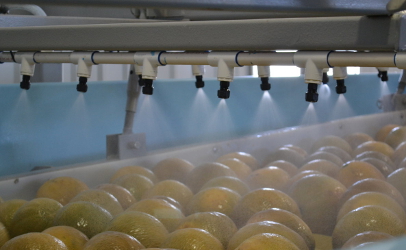Growers are enthusiastically helping a team of scientists researching how cantaloupes pick up and pass on pathogens in a first-of-its-kind project, but retailers have not stepped up.

The two-year study is at the half-way point and only one retailer has agreed to share with the researchers how cantaloupe is handled in stores, according to an update this week on the work led by produce safety Extension Specialist Laura Strawn of Virginia Polytechnic Institute and State University.
Discovering how to help all links in the supply chain minimize Listeria and Salmonella transfer to and from cantaloupe as it travels the farm-to-fork continuum is the goal of Strawn, who is working with Extension Specialist Ben Chapman of North Carolina State University and microbiologist and food safety Associate Professor Michelle Danyluk from the University of Florida.
A Listeria outbreak traced to fresh cantaloupe in 2011 sickened at least 147, hospitalizing 143 of the victims, killing at a least 35 and contributing to 10 other deaths, according to the Centers for Disease Control and Prevention. Since then there have been studies about how pathogens find their way on to the fruit in the field and packing house, but no one has looked at the entire supply chain before.
The team is specifically looking at contact surfaces, which range from single-use cardboard packing table tops used in the field during harvest to the counters at retail stores where deli staff cuts fresh fruit. The Center for Produce Safety is funding the $217,000 research project.
Without the open-arm reception the cantaloupe industry gave the project, Strawn said her team wouldn’t have been able to gain the real-world knowledge needed to make the results useful. Scientists spent a week this past summer observing cantaloupe harvest crews in Arizona and California and collecting microbial samples from various surfaces the fruit contacted during field packing.
 Members of harvest crews, for example, may wear gloves made of different materials ranging from rubber or nitrile to cotton-blend. They also may employ pack tables covered in materials, such as stainless steel or single-use cardboard. In addition, crews may use stainless steel knives, cotton rags to wipe melons or brushes to remove dirt — all of which were sampled.
Members of harvest crews, for example, may wear gloves made of different materials ranging from rubber or nitrile to cotton-blend. They also may employ pack tables covered in materials, such as stainless steel or single-use cardboard. In addition, crews may use stainless steel knives, cotton rags to wipe melons or brushes to remove dirt — all of which were sampled.
“For them to show us and let us see what it was like in real life and ride along with harvest crews, it was just amazing,” Strawn said in a news release from the Center for Produce Safety. “I was really grateful to them to be able to trust us. We had a lot of doors opened because we were working with a group like CPS.”
At the same time, Chapman is working with retail cooperators to identify surfaces that the cantaloupes may contact. So far, he has identified 17 surfaces, from the distribution center to the retail display. His work includes both whole and cut cantaloupe.
“One of the things that we’re investigating is whether there are certain contact surfaces that are more likely to harbor those pathogens,” he said.
“If there are, we can recommend specific management practices to address those cantaloupe contact surfaces.”
Although only one retailer has stepped forward so far to assist the researchers, Chapman said a few others are interested in participating, which would make the results much more meaningful.
“It’s always better to have more than less,” he said. “If you only have one, they may be special — they may use a different surface or have different operating procedures so we’re not really measuring any variability.”
Once Strawn, Chapman and other members of the research team know more about how pathogens transfer to and from contact surfaces to cantaloupe, Danyluk can put her expertise in sanitizing and cleaning to work. She has done extensive food safety research work on tomatoes and cantaloupe.
Danyluk was also on hand when inspectors checked Florida growers’ cantaloupe operations in the years following the 2011 outbreak, giving her additional insight. The Florida scientist will validate sanitation procedures in the laboratory to ensure any suggestions to industry will be effective.
(To sign up for a free subscription to Food Safety News, click here.)
